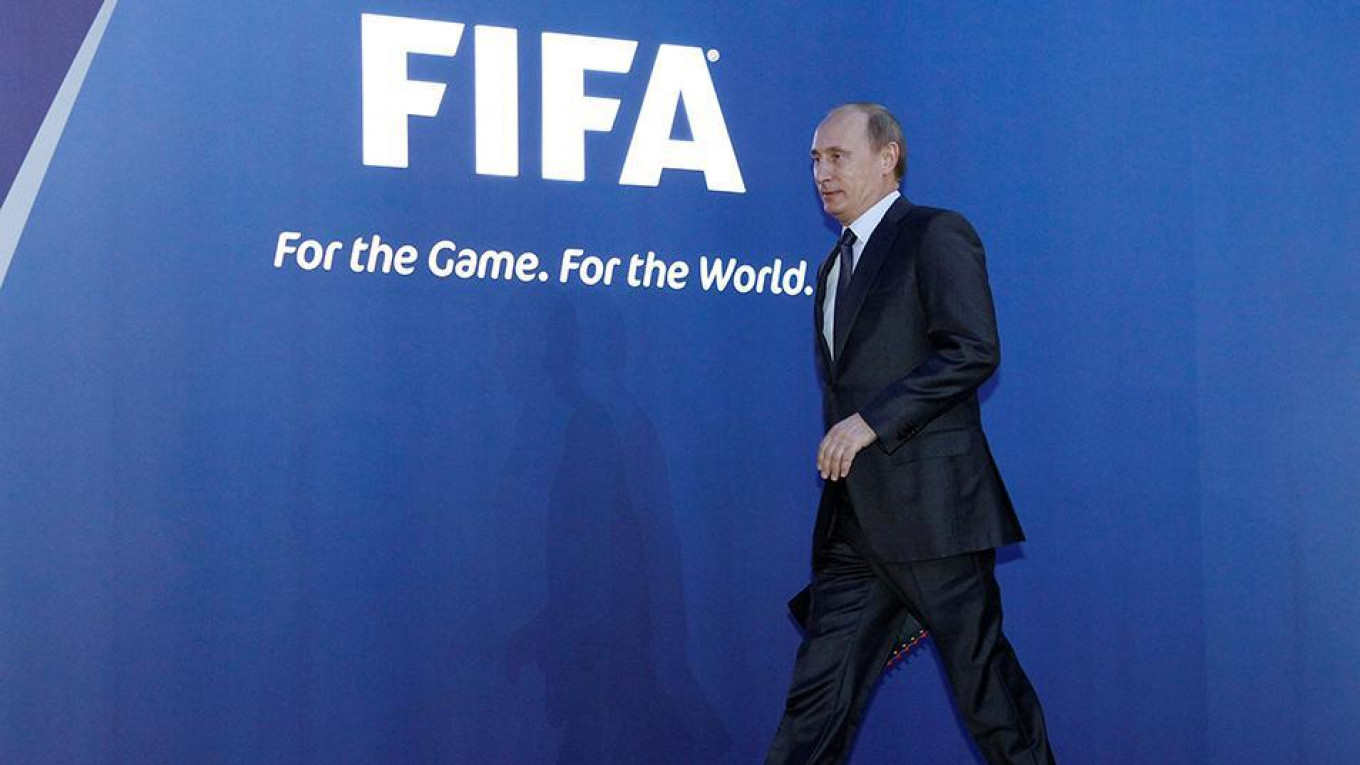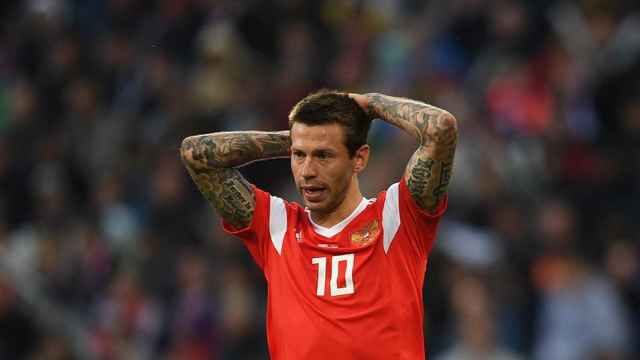In the weeks leading up to the World Cup, a popular joke circulated among Russian football fans: “Who are you going to root for once Russia is knocked out?”
Even though the tournament’s hosts pummeled Saudi Arabia 5-0 in the opening match on Thursday, they almost certainly will be eliminated. And likely sooner rather than later. Despite being in one of the tournament’s easiest groups and playing to home crowds, Russia, according to the latest FIFA ranking, is fielding the World Cup’s weakest side.
Before beating Saudi, Russia had done little to inspire the hopes of its fans. Russia had last won eight months ago and only because two South Korean own goals prevented the game from ending in a draw. In Russia’s last two matches against teams that failed to qualify for the World Cup, it was only able to muster one shot on target.
Russia’s dismal record has many fans asking: ‘Who are you going to root for once Russia is knocked out?’
These dismal displays have left Russian supporters clear-eyed about their national team’s chances. Of nearly 65,000 respondents to a recent Sports.ru poll on how far Russia will advance in the tournament, 73 percent said the team will fail to exit the group stage. It is a sober prediction: Since the fall of the Soviet Union in 1991, Russia has never advanced into the World Cup’s knockout rounds.
Even the insatiably patriotic President Vladimir Putin has apparently given up on the home team. “Sadly, our team has not enjoyed great results lately,” he said last week. Although he added that he hopes Russia will “fight to the finish,” he tipped Argentina, Brazil, Germany and Spain to raise the 18-carat-gold trophy at Luzhniki Stadium in Moscow on July 15.
Other Russia supporters are more blunt. “We all know we’ll lose pretty early on, so many of us have picked different teams to support,” Sergei, a 40-year-old Muscovite, told me outside Moscow’s VEB Arena last week. “Some people have picked France, some Germany, another person Spain, another England.”
“At the end of the day, we all just love good football.”
According to the state-run Public Opinion Foundation pollster, after Russia, most home fans support Germany, Brazil and Spain, respectively.
Sergei, who wore a scarf decorated with the Russian flag, was waiting to watch his team play Turkey in its last match before the tournament kicks off. Unfortunately, good football did not lie in store. Lethargic and plodding, Russia failed to break down the Turkish squad, which on this occasion consisted of fresh-faced players gaining international playing experience.
Like Sergei, dozens of supporters milling about outside the stadium before the match were clad in Russian regalia, but bled the colors of other nations underneath.
Both Timur Sultanov, 10, and his father Kasym, 38, could barely contain their excitement over getting to see France play Peru on home soil. “We can’t wait,” Kasym said. “We’re rooting for both teams,” his son added, “because we love Antoine Griezmann” — of France — “and Jefferson Farfan” — of Peru, who plays club football for Lokomotiv Moscow. (Timur agreed to be quoted on the condition it was also noted that he plays for a rival club’s youth team: CSKA.)
Unlike most footballs fans at CSKA’s VEB Arena, the Sultanovs were confident Russia would find a way out of the group stage. But that wouldn’t stop some fans, Kasym said, from rooting for France, Peru and others to hoist the trophy because Russia will at some point “probably lose,” he explained to Timur.
Nearby, another parent-child duo were less conciliatory. Draped in a Russian flag, Anastasia Kravchenka, 16, and her mother Elena, 47, said they would be supporting their country no matter what. Anastasia, a military cadet, explained on behalf of her and her mother, a civil servant: “We are patriots.”
Still, would the pair not — even just for the fun of it — cheer for another team if Russia crashes out? Elena squinted. After a few moments, she replied, “We’ll be with Russia till the end.”
Evan Gershkovich is a reporter at The Moscow Times. The views and opinions expressed in opinion pieces do not necessarily reflect the position of The Moscow Times.
A Message from The Moscow Times:
Dear readers,
We are facing unprecedented challenges. Russia's Prosecutor General's Office has designated The Moscow Times as an "undesirable" organization, criminalizing our work and putting our staff at risk of prosecution. This follows our earlier unjust labeling as a "foreign agent."
These actions are direct attempts to silence independent journalism in Russia. The authorities claim our work "discredits the decisions of the Russian leadership." We see things differently: we strive to provide accurate, unbiased reporting on Russia.
We, the journalists of The Moscow Times, refuse to be silenced. But to continue our work, we need your help.
Your support, no matter how small, makes a world of difference. If you can, please support us monthly starting from just $2. It's quick to set up, and every contribution makes a significant impact.
By supporting The Moscow Times, you're defending open, independent journalism in the face of repression. Thank you for standing with us.
Remind me later.








